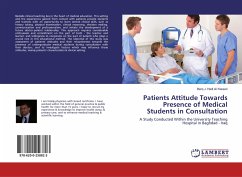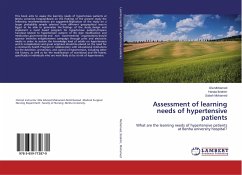Nicht lieferbar

Effect Of Integrative Medicine In Patients With Schizophrenia An intervention Study
Versandkostenfrei!
Nicht lieferbar
INTRODUCTION "Schizophrenia is Arguably the Worst Disease Affecting Mankind" (Nature 1988) Since ages, the disorder we now call as schizophrenia has been a source of bewilderment and fear for laymen. The origin of this condition was believed to be due to the curse of God and possession of demon and the persons suffering from schizophrenia were tormented, exiled or locked up forever. However, since few decades the scenario is changing. With the insights from medical science, neuroscience and neuropsychology, the illness is relatively demystified. It is understood as a form of mental illnesses w...
INTRODUCTION "Schizophrenia is Arguably the Worst Disease Affecting Mankind" (Nature 1988) Since ages, the disorder we now call as schizophrenia has been a source of bewilderment and fear for laymen. The origin of this condition was believed to be due to the curse of God and possession of demon and the persons suffering from schizophrenia were tormented, exiled or locked up forever. However, since few decades the scenario is changing. With the insights from medical science, neuroscience and neuropsychology, the illness is relatively demystified. It is understood as a form of mental illnesses with bio psychosocial etiology that affects the person¿s perceptual, cognitive, emotional and behavioral aspects of personality. There are effective and humane treatments available, making the illness less threatening. In spite of these, even today the diagnosis of schizophrenia is distressing and devastating news for family members. 1.1 Schizophrenia - Definition Schizophrenia is defined in dictionaries as "a mental disorder that is characterized by disturbances in thought (such as delusions), perception (such as hallucinations), and behavior (such as disorganized speech or catatonic behavior), by a loss of emotional responsiveness and extreme apathy, and by noticeable deterioration in the level of functioning in everyday life". (Merriam-Webster¿s Collegiate Dictionary) 1.2 Incidence and Prevalence Schizophrenia is found all over the world. It is the most common form of psychotic disorder. ¿The global age-standardized point prevalence of schizophrenia was found to be 0.28% in 2016. No gender differences were observed in prevalence. Prevalence rates did not vary widely across countries or regions. Globally 20.9 million cases were prevalent in 2016¿ (Charlson et al 2018). The incidence is about 1.5 per 10,000 people (McGrath , Saha , Chant & Welham 2008). Age of onset is typically during adolescence, childhood and late-life onset are rare. Men are 2 diagnosed slightly more than women ( Abel & Drake, 2010), and women tend to be diagnosed later in life than men. There is also some indication that the prognosis is worse in men (Grossman 2008, Usall & Ochoa 2003). Schizophrenia represents about 1% of the global burden of disease (World Health Organization, 1996). 1.3 History of Schizophrenia The history of schizophrenia does not have a documented, long historical narrative. The word schizophrenia is just 100 year old and accounts of exactly schizophrenia-like syndrome are rare in the historical record prior to the 19th century, although reports of irrational, unintelligible, or uncontrolled behavior were common. It is also possible that it may have been obscured in historical writings by related concepts such as madness, melancholia or mania (Heinrichs 2003). Atharva Veda of India, an ancient Hindu scripture that date back approximately 1400 BC, mentions about madness and posited that imbalance in 5 elements , and 3 humours, might result in such condition. (Kyziridis 2005). As explored by researchers, there has been an interpretation that some brief notes in the ¿Ancient Egyptian Ebers Papyrus¿ may imply schizophrenia (Okasha & Okasha, 2000). A review of ancient Greek and Roman literature indicated that although psychosis was described, there was no account of a condition meeting the criteria for schizophrenia ( Evans, McGrath , Milns 2003) In Indian system of Ayurveda , 9th chapter of " Charaka Samhita Chikitsa Sthana" mentions about , the symptoms of which are similar with schizophrenia symptoms. ¿ ¿ ¿ ¿ ¿ ¿ It says the signs and symptoms of unmada are intellectual confusion, fickleness of mind, impatience, unsteadiness of eyes, irrelevant speech, and a sensation of vacuum in the heart ( Hebbar 2015) 3 In the 5th and 4th centuries BC, Plato stated two kinds of madness,













